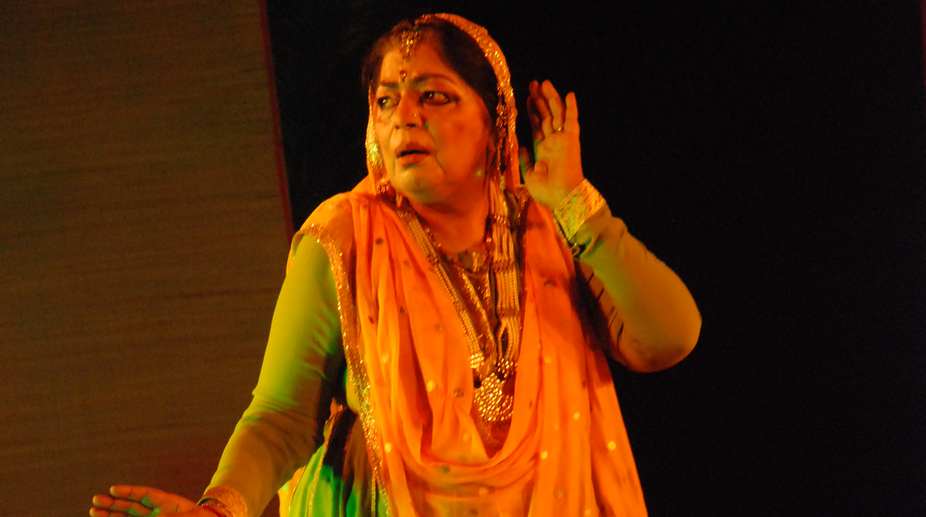Devoleena Bhattacharjee celebrates her son Joy’s Annaprashan ceremony
Recently, Devoleena talked about how her role in the popular TV show 'Saath Nibhaana Saathiya' helped her on her spiritual journey.

Dancer Uma Sharma (Photo: IANS)
If dance is about inspiration, then for renowned Kathak dancer Uma Sharma it has always been Lord Krishna who continues to motivate her. For the past 30 years, Sharma has been presenting the “raas leela” of Vrindavan through dance.
“Kathak is ‘katha kahe so kathak kehlawa’; the dance form itself speaks of the stories associated with Lord Krishna. It’s a narration of a story, through gestures, and suddenly one starts using footwork movements to express the happiness,” the 74-year-old dancer told IANS in an interview.
Advertisement
In 1973, Sharma became the youngest dancer to have been honoured with the Padma Shri. In 2001, she was conferred the Padma Bhushan for her contribution towards enriching classical dance.
Advertisement
She was also bestowed with the Sangeet Natak Akademi Award and also the Sahitya Kala Parishad Award. Sharma has also been honoured with the “Srijan Manishi” title by the Akhil Bhartiya Vikram Parishad for her great contribution to Kathak.
Calling herself a traditional dancer, Sharma recollected how her inclination towards Lord Krishna grew.
“I once saw M.S. Subbulakshmi playing Meera and was fascinated the way the character was in love with the lord. I wanted to be a similar kind of devotee. When I took Kathak as my profession, I was automatically inclined towards themes, songs and poses associated with Krishna,” the dancer remembered.
It was during the early days, when Sharma started reading poems of Surdas, Raidas and other poets belonging to the 15th and 16th centuries who wrote on Lord Krishna, that she found a sense of belonging. Her discovery of love for Krishna took a prominent shape when she chose Kathak as her profession.
Born in Dholpur, Rajasthan, in a strict Brahmin family, Sharma believes that her family atmosphere has also been largely responsible for encouraging her devotion towards Lord Krishna.
“My family has been an avid worshiper of Krishna. Janmashtami is a big festival for us. Ever since my childhood I have grown up (in an environment) where loving Lord Krishna has been encouraged,” noted Sharma, who belongs to the Jaipur gharana.
Her devotion and love became stronger with time as she often used to visit Vrindavan for her research on the “raas leela” theme.
“Krishna came nearer to me as the days passed by. And every year I merge raas leela with Kathak. I would bring up new aspects and perform on Krishna as the theme,” she said.
Even though there have been many changes in the presentation of the Kathak dance, Sharma believes that she has been successful in creating her own genre in the dance form and doesn’t feel the need to bring about much change.
“I don’t feel any sort of challenge; rather I am very much satisfied the way I represent Kathak. What I keep looking for is different aspects in the Krishna theme like going deep into Mahabharata and narrating the unheard stories through movements… I have worked so much on the Krishna theme that I am in it; Krishna is now within me and I am in Krishna,” the dancer stated.
Sharma however feels that the only challenge that lies ahead of her is teaching the younger generation the older form of traditional dances.
“Today’s youth are not aware of the stories associated with mythology, sagas or Lord Krishna. In my dance school I teach young students how to bring out the emotions of love, relationship between Krishna and Radha or his raas leela with gopis. It is my attempt to carry forward those stories through my dance form,” she said.
She might be a devotee of Krishna but that does not stop her from incorporating other themes in her performances.
“I am choreographing a number of ballets. I brought other poets into Kathak, whether it’s Ghalib or Kaifi Azmi in Urdu, Tagore and Nazrul in Bengali, or other languages. I am already bringing in sonnets of other languages to perform,” she concluded.
Advertisement
Recently, Devoleena talked about how her role in the popular TV show 'Saath Nibhaana Saathiya' helped her on her spiritual journey.
Uttar Pradesh Chief Minister Yogi Adityanath on Sunday said that no force can stop a society inspired by its national heroes and heroines, citing Lokmata Ahilyabai Holkar’s life as a shining example.
The Sevayat Goswami priests of the famous Shree Banke Bihari temple are at loggerheads with the Uttar Pradesh government over the proposed corridor and an ordinance to set up a Trust to manage the temple.
Advertisement
